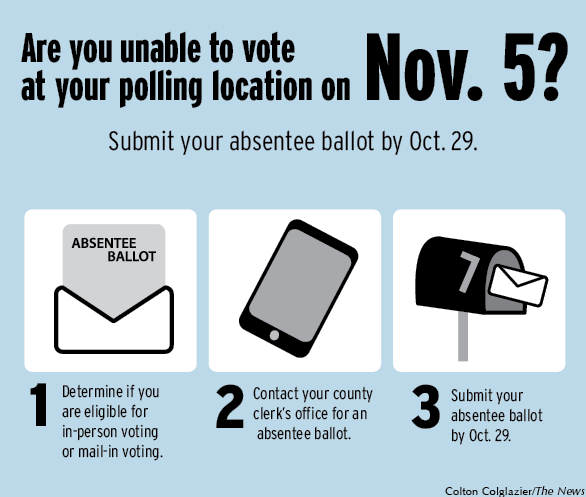Emily Shepherd
Contributing Writer
eshepherd2@murraystate.edu
For voters who do not reside in the Murray area, the deadline to cast absentee ballots in Kentucky is Oct. 29.
Voters who can’t make it to the polls on Nov. 5 can still make their voices heard in the upcoming election by submitting an absentee ballot.
Talia Smith, public relations representative for DoSomething.org, said the 2018 election showed an increase of absentee voters.
“The 2018 election broke the record for the number of absentee and early votes in any midterm election in American history, helping to change election outcomes nationwide,” Smith said. “The trend of early voting continues to grow, and the millions of out-of-state college students, who are often far away from their voting location, prefer voting absentee 2:1.”
To vote with an absentee ballot in Kentucky, voters must follow specific procedures. Two options are available for absentee voters: mail-in voting or in-person voting. However, early voting and unexcused absentee voting are prohibited in Kentucky.
For each option, there are certain requirements voters must meet.
According to the State Board of Elections, to qualify to vote by mail-in absentee ballot, voters must be advanced in age, disabled or ill; military personnel, dependent or overseas citizen; students who temporarily reside outside the county; voters who temporarily reside outside of Kentucky, but are still eligible to vote in Kentucky; incarcerated, but not yet convicted of a crime; or voters prevented from voting in person on election day or casting an in-person absentee ballot.
Mail-in absentee ballots can only be obtained by contacting the county clerk’s office.
According to the State Board of Elections, requirements for in-person absentee voters are similar. To be an eligible in-person absentee voter, voters must be out of the county on election day; advanced in age, disabled or ill; military personnel, dependent or overseas citizens; students who temporarily reside outside of the county; voters or spouses of voters who have surgery scheduled that will require hospitalization on Election Day; or pregnant women in their third trimester.
Jennifer Morrison, assistant professor of political science, encourages students to vote.
“Don’t think your vote doesn’t count, last year only a quarter of Kentuckians voted,” Morrison said. “Vote regardless of your party or your beliefs. It’s a right that’s been fought for, and we should use it.”
Kelsey Whalen, graduate from Barnhart, Missouri, said she is an absentee voter because she wants her voice heard.
“The way they have things set up it made voting inconvenient, but it’s something I’m passionate about so I tried to plan ahead,” Whalen said. “I knew I wouldn’t be able to go home to vote… If students want to see change, they need to vote for the candidate that wants to better higher education.”
Whalen participated in the 2016 presidential election using an absentee ballot. She signed up for a ballot online, received the ballot in the mail and mailed the ballot to her county after filling it out.
“My parents participated in the 2016 election too by absentee voting and they were in Jamaica,” Whalen said.
In the 2016 election, it bothered Whalen that many of her friends didn’t make the effort to vote.
“I didn’t know a single person who was voting absentee,” Whalen said. “They [people who don’t participate in voting] are the same people who complain about the government and our leaders, but at the same time don’t do anything about it.”
Kentucky residents can check their voting status and learn more about the absentee voting process at www.GoVoteKy.com.
Students who do not reside in Kentucky should contact their local county clerk’s office for more information about absentee voting in their state.




























































































